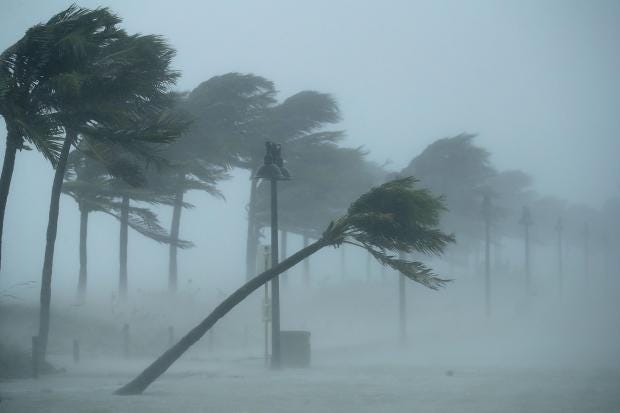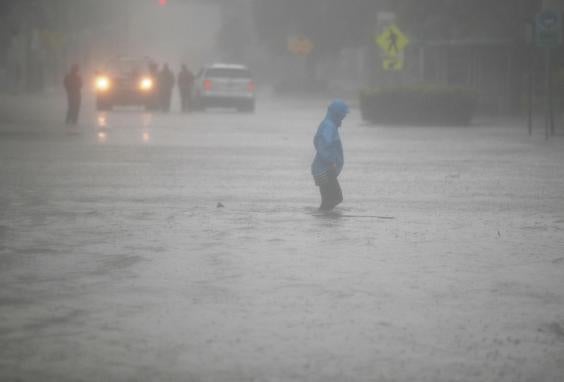Irma: Florida pounded hard by 'some big monster', says President Donald Trump
Millions
of people are without power and several states are next in line

11
September, 2017
Florida
has been pounded hard by what President Donald Trump called “some
big monster”, as Hurricane Irma tore into the state, leaving a
trail of damage and death and causing destruction that will likely
take weeks or months to repair.
At
least three people were killed as the category four hurricane made
landfall in the Florida Keys and worked its way up the southwest
coast, leaving more than three million properties and businesses
without power and millions of people hunkering down in their homes or
emergency shelters.
As
Florida Governor Rick Scott asked “everybody” to pray for the
state, Irma passed over several cities, striking land for a second
time close to Naples and making its way towards Tampa. It weakened
slightly as it moved, down to a category two hurricane with winds of
at least 105mph.

The
US National Hurricane Center said the path of Irma should move over
or near the western coast of Florida before moving over inland
northern parts of Florida and Georgia into Monday afternoon.
Television
footage from various locations across the east of the state showed
palm trees bent over under the force of huge winds, driving rain and
flash floods caused by the storm surge. Naples was expected to see a
surge of up to 10ft and the city’s airport reported a peak wind
gust of 142 mph.
In
Naples, Judy and Herve Ligeos said they had prepared for the
potential of three to four days without access to amenities. They
stocked up on propane to cook with, and on food and water.
Roughly
half-an-hour before Irma passed over she told The Independent they
could not see anything out their hurricane-proof windows, but were
happy their cinder block home had managed to hold onto its roof.
“It’s almost like a white out. You can’t see,” she said,
likening her view to a heavy fog that a skier might encounter.
“There's so much rain that all you can see is white."
At
the White House, Mr Trump was briefed about the path of the storm and
the preparations that had been made by the director of the Federal
Emergency Management Agency.
“The
bad news is that this is some big monster,” Mr Trump told
reporters. “Right now, we are worried about lives, not cost.”
He
vowed he would soon pay a visit to Florida.
The
White House said the President, who was with his cabinet at Camp
David, also spoke to the governors of Alabama, Georgia, South
Carolina and Tennessee, as Irma moved northwards.
In
Hollywood, on Florida’s east coast, streets were largely deserted
as winds picked up, bending palm trees and downing power lines, even
though the city is more than 100 mph from the centre of the path of
the storm. By evening, as Irma moved up the west coast and lost a
little power, hurricane winds extended 80 miles from the centre and
due to its size tropical storm-force winds extended up to 220 miles
from the centre of the storm.
While
certain cities were preparing for the full force of the storm, the
size of which has not been seen by some locations close to a century,
the power of Irma is likely to be felt by millions of people. Before
Irma made landfall, up to seven million in the country’s southeast
people received warnings to either leave.
The
hurricane first made landfall at Cudjoe Key in the lower Florida Keys
at 9.10am with top sustained winds of up to 130 mph. It struck land a
second time at Marco Island, close to Naples, with 115 mph winds at
3.35pm.
In
the Florida Keys, a 120-mile string of islands that start south of
Miami and run down to the fabled resort of Key West, up to 30,000
people listened to urgent requests for residents to evacuate with
Irma bringing a 10ft storm surge. However, an untold number of
residents declined to leave; many said they had faced and survived
similar storms many times before.
John
Huston, who was riding out the storm at his Key Largo home, was
already seeing flooding in his yard before the arrival of high tide.
“Small boats floating down the street next to furniture and
refrigerators. Very noisy,” he told the AP by text message.
“Shingles are coming off.”
In
the centre of Miami, one of two dozen construction cranes that stand
on the skyline, collapsed onto a high-rise building under the force
of Irma’s winds.
The Germain Arena just outside Naples is now home to 5,000 Floridians who have fled Hurricane #Irma http://bbc.in/2wTASBj
There
was no immediate word on any damage or injuries. City officials said
it would have taken about two weeks to have moved the cranes out of
the course of the storm.
“Once
this system passes through, it’s going to be a race to save lives
and sustain lives,” Brock Long, the FEMA chief, told Fox News.
The
state’s governor has activated all 7,000 members of the Florida
National Guard, and 30,000 guardsmen from elsewhere were on standby.
A
Miami woman who went into labour was guided through delivery by phone
when authorities couldn't reach her in high winds and street
flooding. Firefighters later took her to the hospital.
An
apparent tornado spun off by Irma destroyed six mobile homes in Palm
Bay, midway up the Atlantic coast. Flooding was reported along
Interstate 4, which cuts across Florida's midsection.
Curfews
were imposed in Miami, Tampa, Fort Lauderdale and much of the rest of
South Florida, and some arrests of violators were reported. Miami
Beach barred outsiders from the island.
Fort
Lauderdale police arrested nine people they said were caught on TV
cameras looting sneakers and other items from a sporting goods store
and a pawn shop during the hurricane.
After
Irma had smashed through the Caribbean as a category five storm,
killing around two dozen people, more than seven million US residents
were told to evacuate inland - including more than six million in
Florida alone. Many will not know what they will face upon their
return.
Given
its sheer size and strength - and its projected course - Irma could
prove one of the most devastating hurricanes ever to hit Florida and
inflict damage on a scale not seen here in 25 years.
Hurricane
Andrew smashed into Miami in 1992 with winds topping 165 mph damaging
or blowing apart over 125,000 homes. The damage in Florida totaled
$26bn, and at least 40 people died.
Hurricane
Harvey - which hit Texas last month - and Hurricane Irma have both
had their names retired, meaning no storm can take that moniker
again. It is the first time two consecutive hurricanes have had their
names retired in the region since Rita and Stan in 2005.
Stephen Ba-Noon is in Orlando, Florida



No comments:
Post a Comment
Note: only a member of this blog may post a comment.